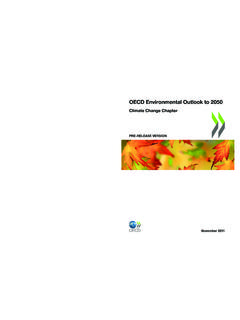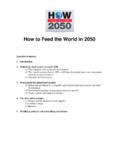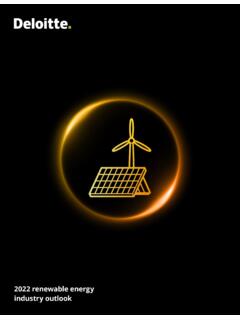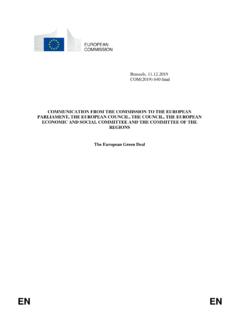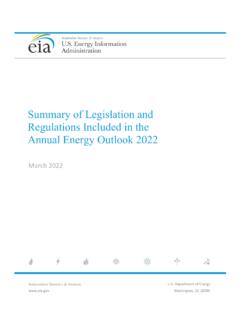Transcription of Climate Change Needs Behavior Change - Rare
1 Climate Change Needs Behavior Change Making the Case for Behavioral Solutions to Reduce Global Warming RARE KNOWLEDGE. Sharing learnings, lessons and insights from behavioral science and conservation around the world AUTHORS. Katie Williamson, Aven Satre-Meloy, Katie Velasco, Kevin Green CITATION. Williamson, K., Satre-Meloy, A., Velasco, K., & Green, K., 2018. Climate Change Needs Behavior Change : Making the Case For Behavioral Solutions to Reduce Global Warming. Arlington, VA: Rare. Available online at ACKNOWLEDGMENTS.
2 This report builds on the groundbreaking work in Drawdown: The Most Comprehensive Plan Ever Proposed to Reverse Global Warming by editor Paul Hawken and contributing authors. We are grateful for significant contributions by Elise Gilchrist, science communications fellow with the Center for Behavior & the Environment and graduate student at Yale University's School of Forestry and Environmental Studies. This report also benefited from reviews and helpful comments by Ann-Kathrin Neureuther, Brett Jenks, Toby Park, and Paula Caballero.
3 With generous support from: Harold M. & Adeline S. Morrison Family F O U N DAT I O N. EDITING AND DESIGN. Corinn Weiler, Kyla Timberlake Photo: Jason Houston Table of Contents Foreword.. 5. Foundations of Climate Change and the role for human Behavior .. 7. Behavioral solutions to reduce emissions.. 13. Understanding human Behavior .. 33. Applying Behavior Change tools to natural resource conservation and Climate action .. 39. Appendix: A ranked list of all 80 Drawdown Solutions.. 44. References.. 48. Endnotes .. 51. Solving the global Climate Change crisis is going to rely on, in one way or another, changing human Behavior .
4 Photo: Jason Houston 4. Foreword Climate Change is the defining global challenge of our time. in evolutionary biology tell us also that people are inherently Rapid changes to the global Climate over the past several social animals and that self-interest' is far more complex decades have already resulted in widespread impacts across than once assumed. Under the right conditions, we excel at human societies and natural systems. Continued changes of this cooperation, seek reciprocity, and act on the basis of social magnitude will have severe and irreversible planetary impacts cues.
5 And we have learned that our decision-making process lasting hundreds of thousands of years, further threatening is strongly influenced by the contextual environment in which people and communities everywhere. we make decisions and the way choices are presented to us. To get people to Change , we need to design innovative Lessening the worst of Climate impacts requires a substantial solutions that meet them where they are, using the push to limit global temperature changes over the course of this power of emotional appeals, social incentives, and choice century.
6 This in turn depends on humankind's ability to achieve architecture as expertly as we apply economics and policy. rapid and sustained reductions in greenhouse gas emissions over the next several decades. Doing so demands a transformation of Scientists agree that humans are the primary driver of our economy and our systems of production and consumption, global warming, and that this process is happening at an from changing how we generate energy and produce food to unprecedented pace; we need increased political will to act and how we consume goods and services.
7 While the focus for deliver on agreed global temperature targets to avoid the most most of this Change often rests at the scale of government and catastrophic consequences. However, Climate Change Needs industry, changes at the level of individuals, households, and to become everyone's business. This is evidenced by efforts communities are of profoundly greater importance than most such as Drawdown,2 a recently published guide to the 80i most people appreciate. substantive solutions to address global warming, which has quantified the emissions impact (and conversely, the mitigation As individuals, people often report feeling hopeless that they potential) across dozens of domains and solution categories.
8 Our can effect Change on a scale that matters for something as analysis in this report builds on Drawdown's work to specifically big as Climate Change . But individual Behavior Change evaluate the role of individual Behavior and its potential to when taken up by billions of people makes a decisive reduce emissions. Through this process, we identified 30. difference. Nearly two-thirds of global emissions are linked to behavioral solutions that can mitigate percent both direct and indirect forms of human consumption; despite of global emissions from 2020-2050.
9 Indeed, the adoption of what the headlines suggest, even conservative estimates sustainable behaviors is a key component of solving the Climate for the potential of changing behaviors to reduce natural Change challenge, especially if scaled up through collective resource consumption represent an enormous contribution to action across communities and countries. reducing global emissions. Achieving this potential, however, is a daunting challenge. It requires finding innovative ways In 2017, Rare launched the Center for Behavior & the of engaging individuals, households, and communities, and Environment to bring the best insights from behavioral changing patterns of production and consumption that are science and design to tackle globally significant and wicked'.
10 Ingrained in routine ways of life. environmental challenges. Among environmental and conservation programs, there remains an immense need to The movement to mitigate Climate Change has tended to rely apply behavioral insights to develop effective approaches and heavily on categories of solutions that include: sweeping global spotlight what solutions are already being deployed at a small- policy reform, offsets and economic incentives to influence scale around the world. industry, and information-based messaging. Without a doubt, each of these is an important component to the worldwide Identifying these solutions, creating a detailed evidence base effort to stop global warming.
